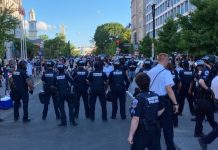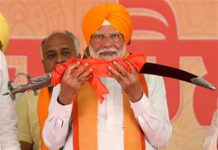Khalistani groups on foreign shores have upped the ante after the Punjab Police launched a crackdown on Amritpal Singh and the other members of his Waris Punjab De group
In recent times, Khalistani groups have been upping the ante both in India and outside, particularly in the United Kingdom, Australia and Canada. Earlier, the hotspot for anti-India activities was mainly considered to be Pakistan and this neighbouring country was squarely blamed for the rise of Waris Punjab De chief Amritpal Singh, a Khalistan sympathiser and a fugitive now.
Outside India, diplomatic missions have been attacked, including most recently in London and San Francisco. Many Hindu temples have been vandalised in Australia and elsewhere. Sikhs currently account for around 1.4% of Canada’s population, or about 500,000 people.
Khalistan is the name of the state some secessionist groups propose to set up by carving out areas of India where the Sikh religion is in the majority. Some Sikh separatist outfits have been increasing their presence and influence in places like Canada, the UK and the United States, which have sizable Sikh diaspora. The genesis of the problem is that the banned terrorist organisation, Sikhs for Justice, is conducting a so-called “Referendum 2020” amid a crackdown on pro-Khalistan leader Amritpal Singh in Punjab.
Incidents in UK
Once the citadel of law and order and decent behaviour, London is now seeing one incident after another, this time with videos on social media platforms showing a man scaling the walls of the High Commission to bring down the Indian flag to the chants of ‘Khalistan Zindabad’. Members of the Indian-origin community gathered outside the Indian High Commission in London in a solidarity show, days after the incident. The demonstration had people from all over. Some in a personal capacity, while others were representing an organisation. Some had tricolour painted on their cheeks in a vibrant display of colours.
A day after India summoned a UK diplomat to protest against attacks, reports of another incident at the San Francisco consulate surfaced and made ripples. The police came in to break up the protests. However, the agitators continued with their sloganeering, chanting “Indian government, shame, shame”. Following the vandalism at the Indian High Commission, the UK High Commissioner to India, Alex Ellis, tweeted his condemnation of the events. He wrote: “I condemn the disgraceful acts today against the people and premises of the Indian High Commission – totally unacceptable.”
British Deputy High Commissioner Christina Scott was summoned to the MEA in view of the incident. “The senior-most UK diplomat in New Delhi was summoned late evening today to convey India’s strong protest at the actions taken by separatist and extremist elements against the Indian High Commission in London earlier in the day,” the MEA said. “An explanation was demanded for the complete absence of British security that allowed these elements to enter the high commission premises,” it said. The MEA said the diplomat was reminded of the basic obligations of the UK government under the Vienna Convention. “India finds unacceptable the indifference of the UK government to the security of Indian diplomatic premises and personnel in the UK,” the MEA said.
The British government highlighted that a small group of pro-Khalistan activists is spreading a false narrative that Britain is colluding with India to persecute Sikhs. It added that though the current threat to the UK from the pro-Khalistan movement is low, it could escalate in the future, warning about “pro-Khalistan extremism emerging from the UK’s Sikh communities.”
The groups are also trying to woo Sikhs in the UK by lobbying for the release of British national Jagtar Singh Johal who was arrested from Jalandhar for his role in the targeted killing of RSS leader and retired brigadier Jagdish Gagneja. Johal’s supporters have been flooding social media platforms with #freejagginow hashtags without mentioning his role in pro-Khalistan killings in Punjab.
Activities in Canada
In another incident, Sameer Kaushal, an Indian-origin journalist in Canada, was heckled by pro-Khalistan protesters in Surrey, British Columbia. Kaushal, said he was in Surrey to cover the Indian High Commissioner’s visit when a pro-Khalistani group threatened and roughed him up. “The Surrey RCMP [police] remained mute spectators to this whole affair, even as the protest turned violent. Instead of stopping them, the police kept asking me to leave for my own safety,” Sameer Kaushal, news director of Radio AM600 tweeted.
India has strongly condemned the so-called Khalistan referendum and the Canadian government for allowing it to take place. New Delhi issued a strongly worded statement calling on Prime Minister Justin Trudeau’s administration to ban the groups behind the vote. “We find it deeply objectionable that politically motivated exercises by extremist elements are allowed to take place in a friendly country,” Arindam Bagchi, spokesperson for India’s Foreign Ministry, had said. “Our position on the efforts by anti-India elements to hold a so-called Khalistan referendum is well-known and has been conveyed to the Canadian Government, both in New Delhi and in Canada,” Bagchi said. While the Canadian government has said that it respects India’s sovereignty and territorial integrity, it has refused to stop the vote.
It is also to be noted that Canada has seen a rise in anti-India activities recently by Khalistan supporters who have vandalised some Hindu temples. Last September, the Ministry of External Affairs issued a statement condemning the rise of hate crimes against Indians and anti-India activities in Canada, expressing their concern with stern language.
The groups are organising, or have already organised protests in Vancouver, Calgary, Edmonton, Winnipeg, Toronto and Montreal. Besides these cities, they have also launched agitations in Punjab by blocking roads leading from interior Punjab to Chandigarh, asking for release of prisoners who have been jailed for militancy. Groups that have blocked the Punjab-Chandigarh borders include a handful of people from diverse organisations affiliated to faith-based groups and farmers unions.
It also noted that rhetoric from clerics in Pakistan is radicalising British Muslims against India. A similar story is evolving in Australia where Khalistan groups have been trying to muster support lately. Sources say that Khalistan supporters have spread to Australia in a bid to raise support for the creation of Khalistan in Punjab and parts of Haryana, Rajasthan, Uttar Pradesh and Himachal Pradesh.
Sources said that support for the Khalistan referendum that took place on 29 January this year was raised through social media with hashtags #freepunjab, #khalistanzindabad, #freepoliticalprisoners and #freesikhprisoners. The website and the voter registration card for the Khalistan referendum in Australia was created in the US, showing close linkages between Khalistani networks across the world.













